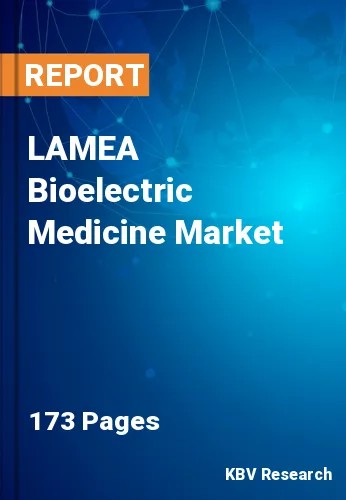
The Latin America, Middle East and Africa Bioelectric Medicine Market would witness market growth of 8.8% CAGR during the forecast period (2023-2030).
A notable trend in the market is the shift toward personalized medicine. Advances in understanding individual variability in response to bioelectric interventions allow for tailored treatment approaches. This trend aligns with the broader movement in healthcare toward precision medicine, acknowledging each patient's unique characteristics and needs. The human body exhibits considerable variability in how it responds to bioelectric interventions. Genetic makeup, physiological characteristics, and environmental influences contribute to this variability. Personalized medicine in bioelectric interventions seeks to understand and leverage these individual differences to optimize treatment outcomes.
Moreover, within the domain of metabolic disorders such as diabetes, there is an ongoing investigation into the potential of bioelectric medicine to modulate glucose levels and enhance insulin sensitivity. Electroceuticals targeting specific metabolic processes and pathways present a new frontier in managing these chronic conditions. Likewise, cardiovascular disorders, including arrhythmias and heart failure, are also within the scope of bioelectric medicine. Implantable devices that modulate the electrical activity of the heart and innovative approaches to treat irregular heart rhythms are gaining attention as potential breakthroughs in cardiovascular care.
Additionally, South Africa, like many other countries, is grappling with an increasing burden of chronic diseases like diabetes, cardiovascular diseases, and musculoskeletal disorders. Bioelectric interventions, which have shown promise in managing chronic pain and neurological conditions, can offer valuable therapeutic options for the aging population. As per the data from the Government of South Africa, in 2022 the estimated population of South Africa included more than five million people aged 60 or older. This represents a 9.2 percent share of the overall South African population. Thus, the rising aging population in the LAMEA region will lead to increased demand in the regional market.
The Brazil market dominated the LAMEA Bioelectric Medicine Market by Country in 2022, and would continue to be a dominant market till 2030; thereby, achieving a market value of $556.7 million by 2030. The Argentina market is showcasing a CAGR of 9.4% during (2023 - 2030). Additionally, The UAE market would register a CAGR of 8.4% during (2023 - 2030).
Based on Type, the market is segmented into Implantable Electroceutical Devices, and Non-invasive Electroceutical Devices. Based on End-use, the market is segmented into Hospitals, and Others. Based on Product, the market is segmented into Implantable Cardioverter Defibrillators & Cardiac Pacemakers, Spinal Cord Stimulators, Cochlear Implants, Deep Brain Stimulators, Transcutaneous Electrical Nerve Stimulators, Sacral & Vagus Nerve Stimulators, and Others. Based on Application, the market is segmented into Arrhythmia, Pain Management, Sensorineural Hearing Loss, Tremor & Epilepsy, Parkinson’s Disease, Depression, Treatment-resistant Depression, Urinary & Fecal Incontinence, and Others. Based on countries, the market is segmented into Brazil, Argentina, UAE, Saudi Arabia, South Africa, Nigeria, and Rest of LAMEA.
Free Valuable Insights: The Worldwide Bioelectric Medicine Market is Projected to reach USD 31.7 billion by 2030, at a CAGR of 6.1%
The market research report covers the analysis of key stake holders of the market. Key companies profiled in the report include Medtronic PLC, Abbott Laboratories, Boston Scientific Corporation, Cochlear Ltd., LivaNova PLC, Koninklijke Philips N.V., Biotronik SE & Co. KG, Sonova Holding AG, Nevro Corporation, and electroCore, Inc.
By Type
By End-use
By Product
By Application
By Country
Our team of dedicated experts can provide you with attractive expansion opportunities for your business.
